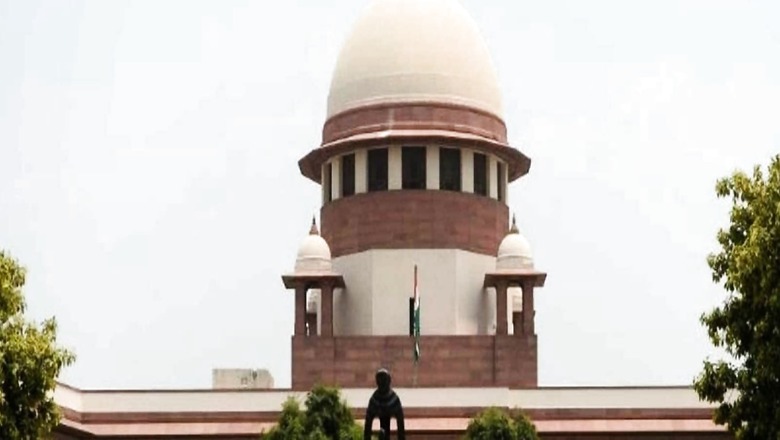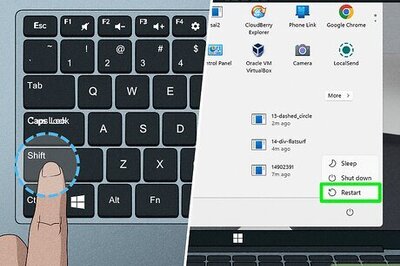
views
The Supreme Court Monday said the report filed by a committee headed by its former judge Justice (retd) D K Jain regarding role of erring police officials in the 1994 espionage case relating to ISRO scientist Nambi Narayanan cannot be the basis for prosecution and the CBI has to probe and collect material in the FIR lodged by it. Narayanan, 79, had been acquitted in the matter and was eventually awarded Rs 50 lakh compensation by the apex court.
The CBI, which has registered an FIR in the matter, has to investigate and proceed as per law, the apex court said. They (CBI) cannot proceed against you (accused) on the basis of the report only. They have to investigate, collect material and then proceed as per law. Ultimately, it is the investigation which will be done. Report cannot be the basis of your prosecution, a bench of Justices A M Khanwilkar and Sanjiv Khanna said.
The bench said this during the hearing after an advocate, appearing for one of the accused, requested that the committee's report be shared with them as the CBI has relied heavily on it. Nothing will turn on the report. The report is only an initial information. Ultimately, CBI will conduct investigation which will have the consequences, the bench said.
At the outset, Solicitor General Tushar Mehta said that the FIR registered by CBI has the gist of the report. The bench mentioned that the report says FIR has been lodged but it has not been uploaded on the website.
It observed the apex court had earlier said that only the committee's report not be made public and authorities are free to proceed as per law. Mehta said the FIR registered in the matter has been filed in the concerned court and it can be uploaded on the website during the course of the day, if the court permits.
We hasten to add that the earlier order only required CBI to ensure that report submitted by the Justice D K Jain committee should not be made public. Now that CBI has finally decided to proceed in the matter, further steps after registration of FIR shall follow as per law and no directions are required in that regard from this court, the bench said. It also observed that accused will have the liberty to avail the remedies available to them and the concerned court will decide on it in accordance with law. At the fag end of hearing, Additional Solicitor General (ASG) S V Raju said that since the committee has filed its report, the panel may have to be wound up.
As the report has been finally acted upon, we accede to the request of ASG S V Raju that Justice D K Jain committee constituted under the order of this court may cease to function, said the bench while appreciating the efforts of the committee. The apex court had on September 14, 2018 appointed a three-member committee, while directing the Kerala government to cough up Rs 50 lakh compensation for compelling Narayanan to undergo "immense humiliation".
It had ordered setting up of the committee to take appropriate steps against the erring officials for causing "tremendous harassment" and "immeasurable anguish" to Narayanan and had directed the Centre and state government to nominate one officer each in the panel. Terming the police action against the ex-scientist of the Indian Space Research Organisation (ISRO) as a "psycho-pathological treatment", the apex court had in September 2018 said that his "liberty and dignity", basic to his human rights, were jeopardised as he was taken into custody and, eventually, despite all the glory of the past, was compelled to face "cynical abhorrence".
The espionage case, which had hit the headlines in 1994, pertained to allegations of transfer of certain confidential documents on India's space programme to foreign countries by two scientists and four others, including two Maldivian women The CBI, in its probe, had said that the then top police officials in Kerala were responsible for Narayanan's illegal arrest. The case also had its political fallout, with a section in the Congress targeting the then Chief Minister late K Karunakaran over the issue, that eventually led to his resignation.
Over a period of almost two-and-a-half years, the panel headed by Justice Jain examined the circumstances leading to the arrest. The former scientist, who was given a clean chit by the CBI, had earlier said that the Kerala police had "fabricated" the case and the technology he was accused to have stolen and sold in the 1994 case did not even exist at that time.
Narayanan had approached the apex court against a Kerala High Court judgement that said no action needed to be taken against former DGP Siby Mathews, who was then heading the SIT probe team, and two retired superintendents of police K K Joshua and S Vijayan, who were later held responsible by the CBI for the scientist's illegal arrest. The CBI, while giving clean chit to the scientist, had said that Siby Mathews had left "the entire investigation to IB surrendering his duties" and ordered indiscriminate arrest of the scientist and others without adequate evidence being on record.
The case had caught attention in October 1994, when Maldivian national Rasheeda was arrested in Thiruvananthapuram for allegedly obtaining secret drawings of ISRO rocket engines to sell to Pakistan. Narayanan, the then director of the cryogenic project at ISRO, was arrested along with the then ISRO Deputy Director D Sasikumaran, and Fousiya Hasan, a Maldivian friend of Rasheeda.
.
Read all the Latest News, Breaking News and Coronavirus News here.




















Comments
0 comment